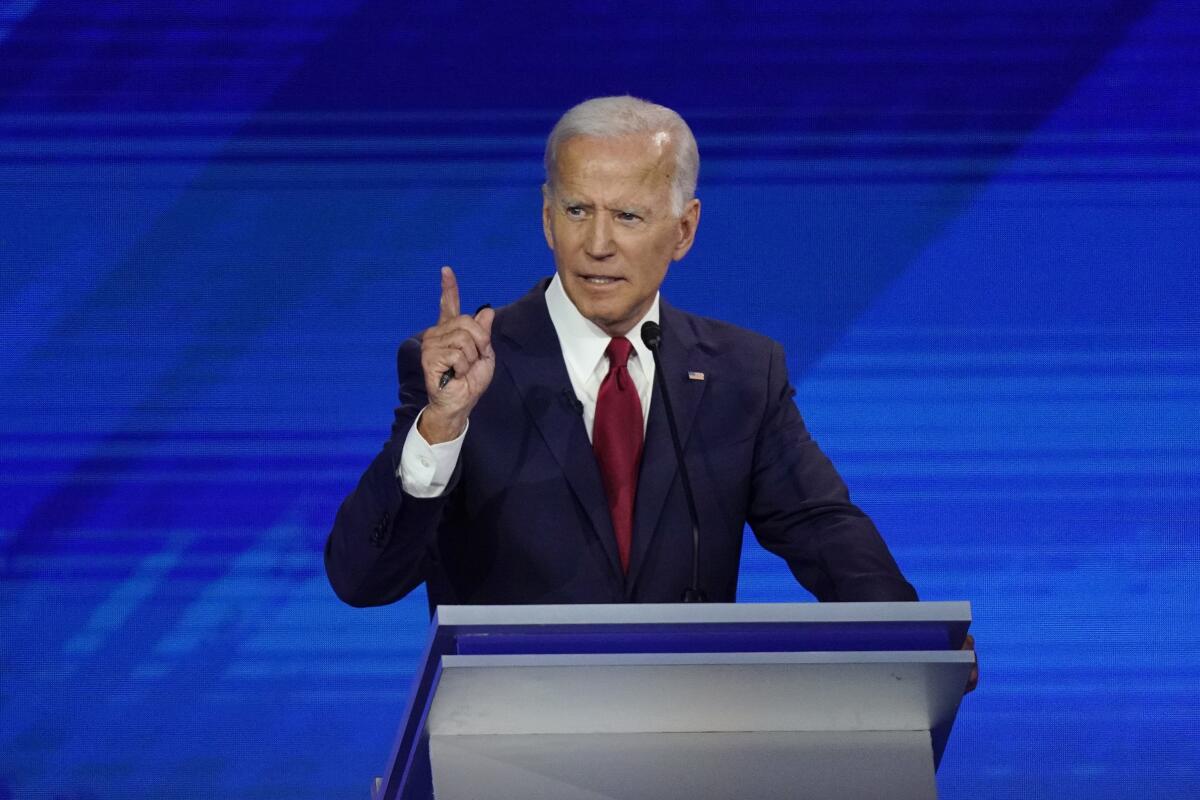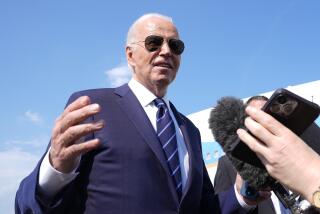Joe Biden’s childhood struggle with a stutter: How he overcame it and how it shaped him

WASHINGTON — One of Joe Biden’s proudest childhood accomplishments was a five-minute speech to his all-boys Catholic high school in Delaware.
The assignment was routine — a public-speaking requirement for all students. But for Biden, it was a triumph in a long struggle to overcome a debilitating stutter.
That struggle led him to brawl with schoolyard bullies, to memorize and recite Irish poetry, and to witness his mother threaten a nun who had humiliated him.
Six decades later, as Biden campaigns for president with his trademark long-winded oratory, few voters would guess he was ever at a loss for words. But he has referred to his struggle with stuttering as “the single most defining thing in [his] life.”
Speech experts say his history of stuttering does not explain all of Biden’s verbal oddities — it does not account for attention-grabbing gaffes such as mixing up Vermont and New Hampshire or misnaming the location of two mass shootings. But he does continue to stutter — at times in ways that are noticeable only to a trained ear, but sometimes obvious enough that he has been derided by detractors, including President Trump.
And the stutter, the experts say, may contribute to his renowned verbosity.
Gerald Maguire, chairman of the psychiatry and neuroscience department at the University of California at Riverside medical school, said it is not uncommon for people who have overcome a stutter to become garrulous once they experience the freedom of fluent speech.
“Once a stutterer becomes fluent, you can’t shut us up,” said Maguire, who is also board chairman of the National Stuttering Assn. “That’s Joe Biden to a T. He just keeps talking. I always cut him some slack.”
Biden only occasionally talks about stuttering — usually to inspire others who stutter — but this was a life chapter that he believes shaped his character.
“I can think of nothing else that has ever stripped me of my dignity as quickly and as profoundly and as thoroughly as when I stuttered in grade school,” he said in a 2008 speech to the American Institute for Stuttering.
Joe Biden doubles down on his argument that he is the Democrats’ best bet to take on President Trump, but there are risks to that strategy.
Valerie Biden Owens, the former vice president’s younger sister, says that one lasting impact of his childhood stutter is that it has given him more empathy and compassion for others’ trials, and it uniquely equips him to handle Trump’s taunts.
“Trump is a bully, and Joe has been standing up to bullies his entire life,” Owens said in an interview. “Joe’s stuttering, I think, is one of the principal reasons — a major, major, major reason — that he is the good and compassionate and kind man that he is.”
About 3 million Americans suffer from the speech impediment of stuttering, marked by involuntary repetition of sounds, syllables or words. According to the National Institute on Deafness and other Communication Disorders, most children outgrow their stutter, but for 25% of them, stuttering is a lifelong challenge.
Biden has overcome the serious stutter of his youth, but remnants of it resurface on occasions such as when he is very tired, he said in a 2016 speech. Experts on stuttering who follow him closely say they have noticed it on several occasions during the campaign, such as an interview on “The View” when he addressed complaints about his tendency to touch and hug women while campaigning, and an April speech in Pittsburgh launching his campaign, when he struggled with words.
Late-night host Trevor Noah joked about the Pittsburgh speech that Biden “was a little out of practice when it came to saying words.” A conservative website, the federalistpapers.org, posted video clips of his stammering and headlined it “Peter Piper Picked a President.”
Trump picked on Biden over verbal stumbles even before the Democrat formally announced his candidacy. When Biden had a slip of the tongue that made it sound prematurely like he was a candidate, Trump pounced on Twitter, and called him “tongue tied” and “another low I.Q. individual.”
Trump’s jab pointed to what Biden has described as unfounded prejudices against people with speech impediments.
“We are thought to be slow-witted,” Biden said in the 2008 speech. “We are thought to have serious emotional problems.”
Heather Grossman, director of the American Institute for Stuttering, has listened to Biden speeches, including his performance during last Thursday’s Democratic debate in Houston. She hears verbal mistakes that anyone could make mixed with episodes of stuttering.
“It’s hard for people to know the difference between a normal word-finding error and stuttering,” she said.
Biden was not available for an interview, but he discussed his speech impediment in his memoir, “Promises to Keep.”
He started worrying about his stutter in grade school when he lived in Scranton, Pa., he wrote. His parents sent him to a speech pathologist when he was in kindergarten, but it didn’t help much so he quit.
He suffered the indignities common to children who stutter. He was given cruel nicknames in high school, one lifted from Latin class: “Joe Impedimenta.” Another nickname was “Dash” — not because he was speedy but because his schoolmates thought it sounded like Morse code when he stammered. He fought with boys who teased him.
His parents were supportive and encouraging, which is not always the case for children who stutter. His mother would tell him things like, “You’re so smart, you can’t get the words out fast enough,” Biden’s sister said.
When a teacher made fun of Biden by calling him “Mr. Bu-bu-bu-Biden,” he walked out of class. His mother took him back to school to discuss the incident and confronted the teacher, who was a nun.
Biden wrote in his memoir that his mother said: “If you ever speak to my son like that again, I’ll come back and rip that bonnet off your head.”
He was motivated to overcome his impediment in part by the cautionary example of an underachieving uncle who had a terrible stutter and used it as “an excuse for everything he didn’t accomplish,” Biden wrote.
Biden never had formal therapy but used techniques suggested by teachers. Because people who stutter often are more fluent when speaking from memory, Biden practiced reciting poetry — in front of a mirror, so he could monitor and control facial distortions that often come with stuttering. To this day, he can spout long passages of Irish poetry from memory.
Joe Biden considered running with Elizabeth Warren in 2016, although their storied battle over bankruptcy policy has left scars more than a decade later.
Some of his coping mechanisms came in handy in his political career. He found it helped him speak fluently if he anticipated encounters with people. As a paperboy, when he prepared to collect payment from a neighbor who was a Yankee fan, he first checked the sports pages to prepare banter about the latest game.
“It teaches you to be extemporaneous. It teaches you to memorize and anticipate,” he said in a 2016 speech. “It makes you focus on what the other person is made of, what may be on their mind. It’s an incredible asset in my business.”
Sometimes Biden’s extemporaneous flights in politics have led to verbal missteps. During President Obama’s tenure, Biden, laughing at his tendency to go off script and Obama’s overly prepared style, would say: “The standing joke in the office is Barack’s learning to speak without a teleprompter; I’m learning to speak with one.”
By the time Biden got out of college and went to law school, he pretty much had the stutter licked. Once elected to the Senate in 1972, however, he remained reluctant to go public with his disability. When he was a junior senator he was asked to get involved with the stuttering institute and declined. He told the group years later that he was ashamed of that, and has since spoken at the group’s annual dinner three times.
His rise to national prominence has inspired many people with speech impediments. When he recently encountered a young man who stutters at a Keene, N.H., campaign stop, he offered encouragement and asked for his phone number.
John Burns, a 23-year-old campaign worker from Bethlehem, N.H., said he tells voters at organizing events about his personal connection to Biden: When he was in the 5th grade and fighting a serious stutter, a speech pathologist told Burns about a U.S. senator who had overcome his childhood stutter.
Burns applied to work with that now-former senator’s presidential campaign soon after it was launched. He’s now one of Biden’s field organizers. In early September, he met Biden for the first time and introduced him at a Laconia, N.H., town hall meeting.
“His classmates would call him Joe Impedimenta. I could relate,” Burns said. “I faced that sort of thing almost every day.”
More to Read
Get the L.A. Times Politics newsletter
Deeply reported insights into legislation, politics and policy from Sacramento, Washington and beyond. In your inbox three times per week.
You may occasionally receive promotional content from the Los Angeles Times.













